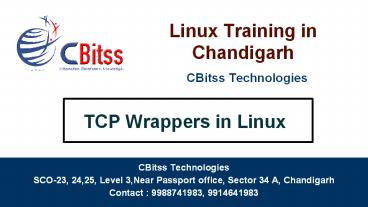Linux Training in Chandigarh (4) - PowerPoint PPT Presentation
Title:
Linux Training in Chandigarh (4)
Description:
Linux Training in Chandigarh provided by Cbitss Technologies. for Detailed information contact us 9914641983 – PowerPoint PPT presentation
Number of Views:33
Title: Linux Training in Chandigarh (4)
1
Linux Training in Chandigarh
- CBitss Technologies
TCP Wrappers in Linux
CBitss Technologies SCO-23, 24,25, Level 3,Near
Passport office, Sector 34 A, Chandigarh Contact
9988741983, 9914641983
2
What is TCP Wrappers in Linux
- TCP Wrapper is a host-based networking ACL
system, used to filter network access to Internet
Protocol servers on (Unix-like) operating systems
such as Linux or BSD. It allows host or
subnetwork IP addresses, names and/or ident query
replies, to be used as tokens on which to filter
for access control purposes.
3
Understanding hosts.allow and hosts.deny
- When a network request reaches your server, TCP
wrappers uses hosts.allow and hosts.deny (in that
order) to determine if the client should be
allowed to use a given service. - By default, these files are empty, all commented
out, or do not exist. Thus, everything is allowed
through the TCP wrappers layer and your system is
left to rely on the firewall for full protection.
Since this is not desired, due to the reason we
stated in the introduction, make sure both files
exist - ls -l /etc/hosts.allow /etc/hosts.deny
4
(No Transcript)
5
Understanding hosts.allow and hosts.deny
- ltservicesgt ltclientsgt ltoption1gt ltoption2gt
... - services is a comma-separated list of services
the current rule should be applied to. - clients represent the list of comma-separated
hostnames or IP addresses affected by the rule.
The following wildcards are accepted - ALL matches everything. Applies both to clients
and services. - LOCAL matches hosts without a period in their
FQDN, such as localhost. - KNOWN indicate a situation where the hostname,
host address, or user are known. - UNKNOWN is the opposite of KNOWN.
- PARANOID causes a connection to be dropped if
reverse DNS lookups (first on IP address to
determine hostname, then on host name to obtain
the IP addresses) return a different address in
each case. - Finally, an optional list of colon-separated
actions indicate what should happen when a given
rule is triggered.
6
CBitss Technologies SCO-23, 24,25, Level 3,Near
Passport office, Sector 34 A, Chandigarh Mobile
- 9914641983 www.cbitss.in/linux-training-in-chan
digarh/
7
CBitss Technologies SCO-23, 24,25, Level 3,Near
Passport office, Sector 34 A, Chandigarh Contact
9988741983, 9914641983































